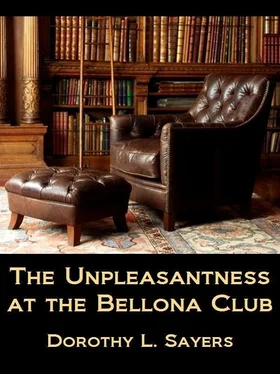“That’ll please her no end. Thanks ever so. I shall look forward to Christmas, for once. Shall I make some toast?”
“Rather!”
Wimsey squatted happily down before the gas-fire, while the modeller went on with her work. Tea and figurine were ready almost at the same moment, and Miss Phelps, flinging off her overall, threw herself luxuriously into a battered arm-chair by the hearth.
“And what can I do for you?”
“You can tell me all you know about Miss Ann Dorland.”
“Ann Dorland? Great heavens! You haven’t fallen for Ann Dorland, have you? I’ve heard she’s coming into a lot of money.”
“You have a perfectly disgusting mind, Miss Phelps. Have some more toast. Excuse me licking my fingers. I have not fallen for the lady. If I had, I’d manage my affairs without assistance. I haven’t even seen her. What’s she like?”
“To look at?”
“Among other things.”
“Well, she’s rather plain. She has dark, straight hair, cut in a bang across the forehead and bobbed — like a Flemish page. Her forehead is broad and she has a square sort of face and a straight nose — quite good. Also, her eyes are good — grey, with nice heavy eyebrows, not fashionable a bit. But she has a bad skin and rather sticky-out teeth. And she’s dumpy.”
“She’s a painter, isn’t she?”
“M’m — well! she paints.”
“I see. A well-off amateur with a studio.”
“Yes. I will say that old Lady Dormer was very decent to her. Ann Dorland, you know, is some sort of far-away distant cousin on the female side of the Fentiman family, and when Lady Dormer first got to hear of her she was an orphan and incredibly poverty-stricken. The old lady liked to have a bit of young life about the house, so she took charge of her, and the wonderful thing is that she didn’t try to monopolise her. She let her have a big place for a studio and bring in any friends she liked and go about as she chose — in reason, of course.”
“Lady Dormer suffered a good deal from oppressive relations in her youth,” said Wimsey.
“I know, but most old people seem to forget that. I’m sure Lady Dormer had time enough. She must have been rather unusual. Mind you, I didn’t know her very well, and I don’t really know a great deal about Ann Dorland. I’ve been there, of course. She gave parties — rather incompetently. And she comes round to some of our studios from time to time. But she isn’t really one of us.”
“Probably one has to be really poor and hard-working to be that.”
“No. You, for instance, fit in quite well on the rare occasions when we have the pleasure. And it doesn’t matter not being able to paint. Look at Bobby Hobart and his ghastly daubs — he’s a perfect dear and everybody loves him. I think Ann Dorland must have a complex of some kind. Complexes explain so much, like the blessed word hippopotamus.”
Wimsey helped himself lavishly to honey and looked receptive.
“I think really,” went on Miss Phelps, “that Ann ought to have been something in the City. She has brains, you know. She’d run anything awfully well. But she isn’t creative. And then, of course so many of our little lot seem to be running love-affairs. And a continual atmosphere of hectic passion is very trying if you haven’t got any of your own.”
“Has Miss Dorland a mind above hectic passion?”
“Well, no. I daresay she would quite have liked — but nothing ever came of it. Why are you interested in having Ann Dorland analyzed?”
“I’ll tell you some day. It isn’t just vulgar curiosity.”
“No, you’re very decent as a rule, or I wouldn’t be telling you all this. I think, really, Ann has a sort of fixed idea that she couldn’t ever possibly attract any one, and so she’s either sentimental and tiresome, or rude and snubbing, and our crowd does hate sentimentality and simply can’t bear to be snubbed. Ann’s rather pathetic, really. As a matter of fact, I think she’s gone off art a bit. Last time I heard about her, she had been telling some one she was going in for social service, or sick-nursing, or something of that kind. I think it’s very sensible. She’d probably get along much better with the people who do that sort of thing. They’re so much more solid and polite.”
“I see. Look here, suppose I ever wanted to run across Miss Dorland accidentally on purpose — where should I be likely to find her?”
“You do seem thrilled about her! I think I should try the Rushworths. They go in rather for science and improving the submerged tenth and things like that. Of course, I suppose Ann’s in mourning now, but I don’t think that would necessarily keep her away from the Rushworths’. Their gatherings aren’t precisely frivolous.”
“Thanks very much. You’re a mine of valuable information. And, for a woman, you don’t ask many questions.”
“Thank you for those few kind words, Lord Peter.”
“I am now free to devote my invaluable attention to your concerns. What is the news? And who is in love with whom?”
“Life is a perfect desert. Nobody is in love with me, and the Schlitzers have had a worse row than usual and separated.”
“No!”
“Yes. Only, owing to financial considerations, they’ve got to go on sharing the same studio — you know that big room over the mews. It must be very awkward having to eat and sleep and work in the same room with somebody you’re being separated from. They don’t even speak, and it’s very awkward when you call on one of them and the other has to pretend not to be able to see or hear you.”
“I shouldn’t think one could keep it up under those circumstances.”
“It’s difficult. I’d have had Olga here, only she is so dreadfully bad-tempered. Besides, neither of them will give up the studio to the other.”
“I see. But isn’t there any third party in the case?”
“Yes — Ulric Fiennes, the sculptor you know. But he can’t have her at his place because his wife’s there, and he’s really dependent on his wife, because his sculpting doesn’t pay. And besides, he’s at work on that colossal group for the Exhibition and he can’t move it; it weighs about twenty tons. And if he went off and took Olga away, his wife would lock him out of the place. It’s very inconvenient being a sculptor. It’s like playing the double-bass; one’s so handicapped by one’s baggage.”
“True. Whereas, when you run away with me, we’ll be able to put all the pottery shepherds and shepherdesses in a handbag.”
“Of course. What fun it will be. Where shall we run to?”
“How about starting to-night and getting as far as Oddenino’s and going on to a show — if you’re not doing anything?”
“You are a loveable man, and I shall call you Peter. Shall we see ‘Betwixt and Between?’”
“The thing they had such a job to get past the censor? Yes, if you like. Is it particularly obscene?”
“No, epicene, I fancy.”
“Oh, I see. Well, I’m quite agreeable. Only I warn you that I shall make a point of asking you the meaning of all the risky bits in a very audible voice.”
“That’s your idea of amusement, is it?”
“Yes. It does make them so wild. People say ‘Hush!’ and giggle, and if I’m lucky I end up with a gorgeous row in the bar.”
“Then I won’t risk it. No. I’ll tell you what I’d really love. We’ll go and see ‘George Barnwell’ at the Elephant and have a fish-and-chips supper afterwards.”
This was agreed upon, and was voted in retrospect a most profitable evening. It finished up with grilled kippers at a friend’s studio in the early hours. Lord Peter returned home to find a note upon the hall-table.
“MY LORD,
The person from Sleuths Incorporated rang up today that he was inclined to acquiesce in your lordship’s opinion, but that he was keeping his eye upon the party and would report further to-morrow. The sandwiches are on the dining-room table if your lordship should require refreshment.
Читать дальше












